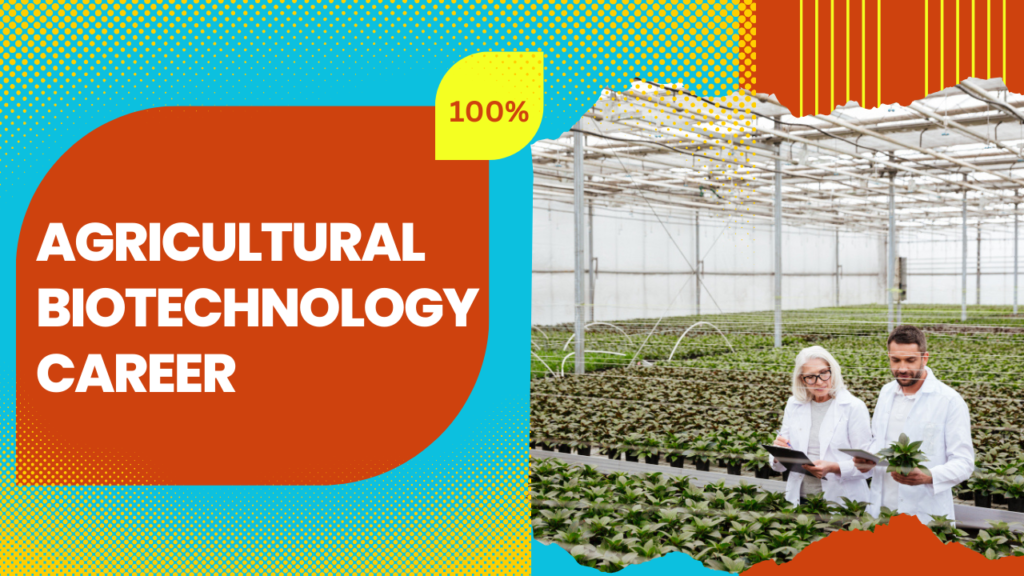Agricultural Biotechnology Career
Technology, especially biotechnology, is becoming more and more entwined with agriculture, which is the science and practice of cultivating crops and rearing animals to generate food, fiber, cooking oil, and other necessities. Agricultural biotechnology businesses actually strive to give farmers the means to produce more animals and crops at a reduced cost. In addition, biotechnology is also utilized in the cultivation of plants that are used as fuel (biofuels) and as ornamental plants, such as orchids.
To accomplish these objectives, biotechnologists create products that guard against illnesses in crops and animals, and help farmers choose the finest seeds and livestock for selective breeding. As an example, a commercial fish farm might raise species such as catfish, tilapia, or salmon. In a similar vein, a dairy farmer might employ genetic testing to identify cows that yield more milk. However, the farm would suffer large financial losses if fish contracted certain diseases, leading to the fish’s death.
Fishermen use biotechnology-derived vaccines to fight illnesses to avoid such problems. Moreover, farming using insects is a more modern agricultural idea. In this instance, companies use a range of cutting-edge technologies, such as sensors that measure temperature, humidity, and oxygen levels, computerized systems that track insect growth, and even vertical farming methods. Thus, biotechnology keeps transforming agriculture, opening doors to more effective and sustainable methods for the sector as a whole.

What is Agricultural Biotechnology?
A field of study called agricultural biotechnology uses technology to raise cattle and crops to higher standards of productivity. It started off concentrating on genetic engineering to change plants to increase their resilience to illnesses and pests. It grew to encompass methods like as molecular breeding, marker-assisted selection, and tissue culture throughout time. More sustainable agricultural methods have so been developed as a result of these advancements. Moreover, by raising crop yields, agricultural biotechnology contributes to the solution of global food security. In the end, it’s critical to raising agriculture’s sustainability and efficiency.
వ్యవసాయ జీవసాంకేతికత అనేది పంటలు మరియు జంతువుల ఉత్పత్తి మరియు నాణ్యతను మెరుగుపరచడానికి సాంకేతికతను అన్వయించే శాస్త్రశాఖ. తొలుత, ఇది పురుగులు మరియు వ్యాధుల ప్రతిఘటనకు జన్యు ఇంజనీరింగ్ను ఉపయోగించి మొక్కలను సవరిస్తోంది. తరువాత, ఇది టిష్యూ కల్చర్, మార్కర్-అసిస్టెడ్ సెలెక్షన్ మరియు మాలిక్యులర్ బ్రిడింగ్ వంటి సాంకేతికతలను కూడా కలిగి ఉంది. ఫలితంగా, ఈ ఆవిష్కరణలు మెరుగైన మరియు స్థిరమైన వ్యవసాయ విధానాలను తీసుకువస్తున్నాయి. అంతేకాకుండా, వ్యవసాయ జీవసాంకేతికత ద్వారా పంటల దిగుబడులు పెరిగిపోవడంతో ప్రపంచ ఆహార భద్రత సమస్యలను ఎదుర్కొవచ్చు. ఈ విధంగా, ఈ శాస్త్రం వ్యవసాయ పరిశ్రమను మరింత సారవంతంగా, మరియు ఆర్థికంగా కూడా సుస్థిరంగా మార్చడంలో కీలక పాత్ర పోషిస్తోంది. అలాగే, ఈ సాంకేతికత పర్యావరణానికి మేలు చేసే విధంగా వ్యవసాయ పద్ధతులను సమర్థవంతంగా అభివృద్ధి చేస్తోంది.
Agricultural Biotechnology Career Opportunities
Agricultural Biotechnology offers diverse career opportunities in fields like crop improvement, genetic engineering, and bioinformatics. Graduates can work in research, agriculture industries, or biotech firms, focusing on developing sustainable agricultural practices and enhancing crop yields through advanced technologies.
Biotechnology Scientist
A Biotechnology Scientist is a professional who applies principles of biology, chemistry, and engineering to solve problems related to living organisms, particularly in the fields of health, agriculture, and the environment. They focus on using biological systems and organisms to develop new technologies, products, and processes. Their work often involves research and development in areas like genetic engineering, drug development, medical diagnostics, agriculture biotechnology (such as creating genetically modified crops), and environmental sustainability.
- Research & Development: Conducting experiments to understand biological processes and develop new biotechnological applications.
- Genetic Engineering: Manipulating the genetic material of organisms to improve traits or produce new products (e.g., insulin production).
- Product Development: Creating biotech products such as medicines, vaccines, biofuels, or biodegradable materials.
- Testing and Analysis: Running tests and analyzing data to ensure the safety and effectiveness of biotechnological products.
- Collaboration: Working with teams of scientists, engineers, and regulatory bodies to bring innovative solutions to market.
Becoming a Biotechnology Scientist typically requires a strong academic background, including a bachelor’s degree in biotechnology, biology, or a related field, followed by advanced studies (Master’s or Ph.D.). Many work in industries like pharmaceuticals, agriculture, environmental conservation, or academia.
Environmental Scientist
By examining the effects of human activity on the environment and creating plans to safeguard ecosystems, an environmental scientist investigates and resolves environmental issues. They are employed in sectors like sustainability, climate change mitigation, natural resource management, and pollution control. Their objective is to develop solutions that strike a balance between society’s and nature’s needs.
An environmental scientist’s main responsibilities include studying environmental problems, gathering and evaluating data on the quality of the air, water, and soil, creating environmental protection policies, counseling governments or organizations on environmental laws, and working on conservation initiatives to save natural habitats.
A degree in environmental science, biology, chemistry, or a similar discipline is normally required to work as an environmental scientist. There are career prospects in research, non-profit organizations, private industry, and government institutions.
Research and Development Engineer
A Research and Development (R&D) Engineer plays a crucial role in the innovation process within various industries, including technology, manufacturing, pharmaceuticals, and engineering. Here’s an overview of their responsibilities, skills, and career prospects:
- Product Development: Design and develop new products or improve existing ones through research and experimentation.
- Testing and Validation: Conduct experiments and tests to validate concepts and ensure products meet required specifications and standards.
- Technical Documentation: Prepare detailed reports, documentation, and presentations on research findings and product designs.
- Collaboration: Work closely with cross-functional teams, including design, manufacturing, and marketing, to ensure successful product development.
- Market Research: Analyze market trends and competitor products to identify opportunities for innovation.
- Problem Solving: Address technical challenges that arise during the development process and implement solutions.
R&D Engineers are essential to driving innovation and ensuring that products are not only functional but also competitive in the marketplace. Their blend of technical expertise and creative problem-solving skills makes them valuable assets to any organization focused on growth and advancement.
Clinical Trial Manager
A Clinical Trial Manager (CTM) plays a vital role in the pharmaceutical and biotechnology industries, overseeing the planning, execution, and management of clinical trials to ensure that they are conducted according to regulatory guidelines, within budget, and on schedule. Here’s an overview of their responsibilities, required skills, and career prospects:
- Trial Planning: Develop detailed plans for clinical trials, including timelines, budgets, and resource allocation.
- Regulatory Compliance: Ensure that all trials comply with regulatory requirements and ethical standards, including obtaining necessary approvals from regulatory bodies and institutional review boards (IRBs).
- Team Management: Lead and coordinate multidisciplinary teams, including clinical research associates (CRAs), data managers, and site staff.
- Site Selection and Management: Identify and select appropriate clinical trial sites, and maintain relationships with site personnel to ensure successful trial execution.
- Monitoring and Reporting: Oversee the progress of clinical trials, including data collection and monitoring patient safety, and prepare reports for stakeholders.
- Budget Management: Manage trial budgets, ensuring that resources are used efficiently and that financial targets are met.
- Problem Solving: Address and resolve issues that arise during the trial process, such as recruitment challenges or data discrepancies.
Clinical Trial Managers are essential for the successful execution of clinical trials, ensuring that new treatments are developed safely and effectively. Their ability to manage complex projects and lead diverse teams makes them key contributors to the advancement of medical research and the development of new therapies.
Bioinformatics Specialist
At the nexus of biology and technology, a bioinformatics specialist is essential. Primarily, they examine intricate biological information, aiding in the comprehension of genetic codes and protein configurations. They also use complex software tools and algorithms to handle and analyze large datasets.
Their efforts therefore greatly enhance the fields of medication development and personalized medicine. Furthermore, working together with scientists and medical professionals improves the use of bioinformatics in practical settings. As such, this industry is changing quickly, offering a lot of room for creativity.
In conclusion, bioinformatics specialists are key players in the future of biotechnology and healthcare, in addition to facilitating ground-breaking research. Their knowledge is therefore becoming more and more important in the current scientific environment.
Regulatory Affairs Specialist
Ensuring that products adhere to all applicable regulations and standards is a critical responsibility of a regulatory affairs specialist. First and foremost, their job is to examine and prepare regulatory submissions to government authorities, which is essential to getting the required approvals. Moreover, they keep abreast of industry standards, guaranteeing that their company complies with evolving demands. They thereby assist in reducing the hazards connected with non-compliance, protecting the public’s health and safety. They also serve as a point of contact for their business with regulatory bodies, promoting clear and efficient communication.
In addition, they frequently work with cross-functional teams from marketing, quality assurance, and research and development to ensure that product initiatives meet regulatory requirements. As a result, their opinions are quite helpful while developing new products. In conclusion, regulatory affairs specialists not only help their firms succeed overall, but they also negotiate difficult regulatory landscapes. Because of this, their knowledge is essential in the rapidly changing pharmaceutical and biotechnology sectors. In the end, they make sure that cutting-edge goods are effectively and safely introduced to the market.
Agricultural Technologist
An Agricultural Technologist is a professional who applies scientific knowledge and technology to enhance agricultural practices and improve the efficiency of farming. Their role involves various responsibilities, including:
- Research and Development: Conducting experiments and trials to develop new agricultural techniques, crops, and technologies that can lead to increased productivity and sustainability.
- Soil and Crop Management: Analyzing soil health and recommending appropriate fertilizers, pesticides, and irrigation methods to optimize crop yields.
- Sustainable Practices: Promoting environmentally friendly farming practices, including organic farming, precision agriculture, and integrated pest management.
- Technical Support: Providing farmers with technical guidance on the use of new technologies and practices, helping them adopt innovative solutions.
- Data Analysis: Collecting and analyzing agricultural data to inform decision-making and improve farming strategies.
- Education and Training: Educating farmers and agricultural workers about best practices, new technologies, and regulatory compliance.
- Collaboration: Working with other professionals, such as agronomists, engineers, and environmental scientists, to develop comprehensive agricultural solutions.
A degree in agricultural science, agricultural technology, or a related field is typically required. Advanced degrees may be beneficial for research and specialized positions. Overall, Agricultural Technologists play a vital role in enhancing food production, ensuring food security, and promoting sustainable agricultural practices.
Training and Development Consultant
A Training and Development Consultant is a professional who specializes in designing, implementing, and evaluating training programs to enhance the skills and knowledge of employees within an organization. Their role is crucial in fostering a culture of continuous learning and improving overall organizational performance. Here’s an overview of their responsibilities, skills, and career opportunities:
- Needs Assessment: Analyzing the training needs of an organization by conducting surveys, interviews, and assessments to identify skill gaps and development areas.
- Program Design: Creating customized training programs that align with the organization’s goals and objectives, utilizing various instructional methods (e.g., workshops, e-learning, on-the-job training).
- Implementation: Facilitating training sessions and workshops, ensuring participants engage with the material and understand the objectives.
- Evaluation and Feedback: Assessing the effectiveness of training programs through feedback, assessments, and performance metrics to determine their impact on employee performance.
- Continuous Improvement: Making recommendations for improving existing training programs and staying updated on industry trends and best practices.
- Coaching and Mentoring: Providing one-on-one coaching to employees to support their development and address specific challenges.
- Collaboration: Working closely with management, HR, and subject matter experts to align training initiatives with business strategies.
Overall, Training and Development Consultants play a vital role in enhancing workforce capabilities, improving employee engagement, and driving organizational success. By investing in employee development, organizations can create a more skilled and motivated workforce, ultimately leading to improved performance and productivity.
Production Manager
Ensuring that manufacturing processes operate effectively and fulfill quality standards is a crucial responsibility of a production manager. First and foremost, they are in charge of managing every stage of the production process, from preparation to finalization. In addition, in order to make sure that every part is in place, they have to work in tandem with other departments including engineering, procurement, and quality assurance. Furthermore, in order to guarantee profitability, a production manager must uphold stringent deadlines and budgets.
As a consequence, they have to keep a close eye on production schedules and take care of any problems that can create delays. In addition, the production manager is responsible for overseeing a group of employees and making sure they are adequately motivated and trained to achieve goals. Comparably, they are also in charge of equipment upkeep and making sure safety procedures are observed. Actually, implementing continuous improvement programs to boost output and cut waste is one of their main responsibilities.
As a result, in order to maintain their competitiveness, they need to keep up with the most recent technological advancements and trends in the business. However juggling these many obligations can be difficult, particularly in times of strong demand. In the end, finally, a productive production manager makes a substantial contribution to the total productivity and profitability of the business.
Technology Transfer Specialist
A Technology Transfer Specialist is a professional responsible for facilitating the transfer of technology, research, or innovation from research institutions (such as universities or government labs) to the private sector. Their role bridges the gap between scientific research and commercialization, ensuring that new discoveries or technologies developed in academic or public research settings are successfully transitioned into practical applications in the marketplace.
- Evaluating Inventions and Discoveries: Assessing new technologies or research outcomes to determine their commercial potential.
- Managing Intellectual Property (IP): Protecting innovations by managing patents, trademarks, and other IP-related activities.
- Licensing and Agreements: Negotiating and drafting licensing agreements with companies or organizations interested in commercializing a technology.
- Industry Collaboration: Building relationships between researchers and potential industry partners or investors.
- Market Research and Strategy: Analyzing market trends and developing strategies to position a technology for successful transfer and commercialization.
- Compliance and Legal Oversight: Ensuring that all legal, regulatory, and institutional policies are followed in the transfer process.
- Educating Researchers: Helping scientists and researchers understand the commercialization process, including aspects like IP protection and business development.
- Supporting Startups: Assisting in the formation of spin-off companies that are based on research or technology developed in an institution.
Technology Transfer Specialists are often found in universities, research institutions, government agencies, and private organizations where innovation and intellectual property play a key role in operations.


